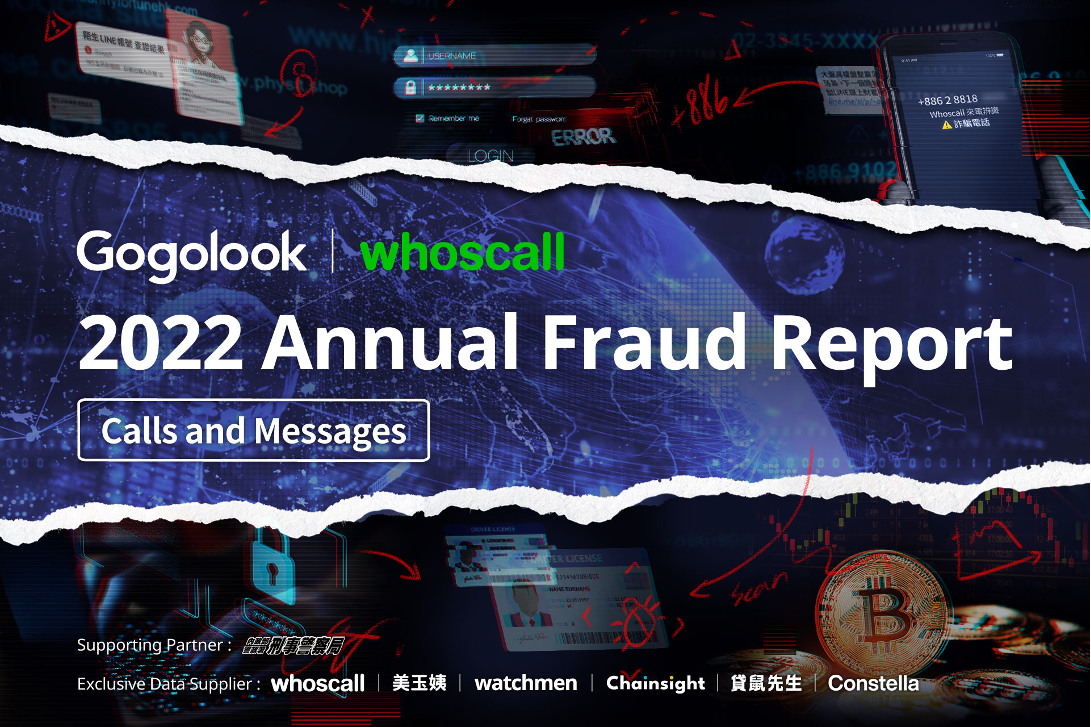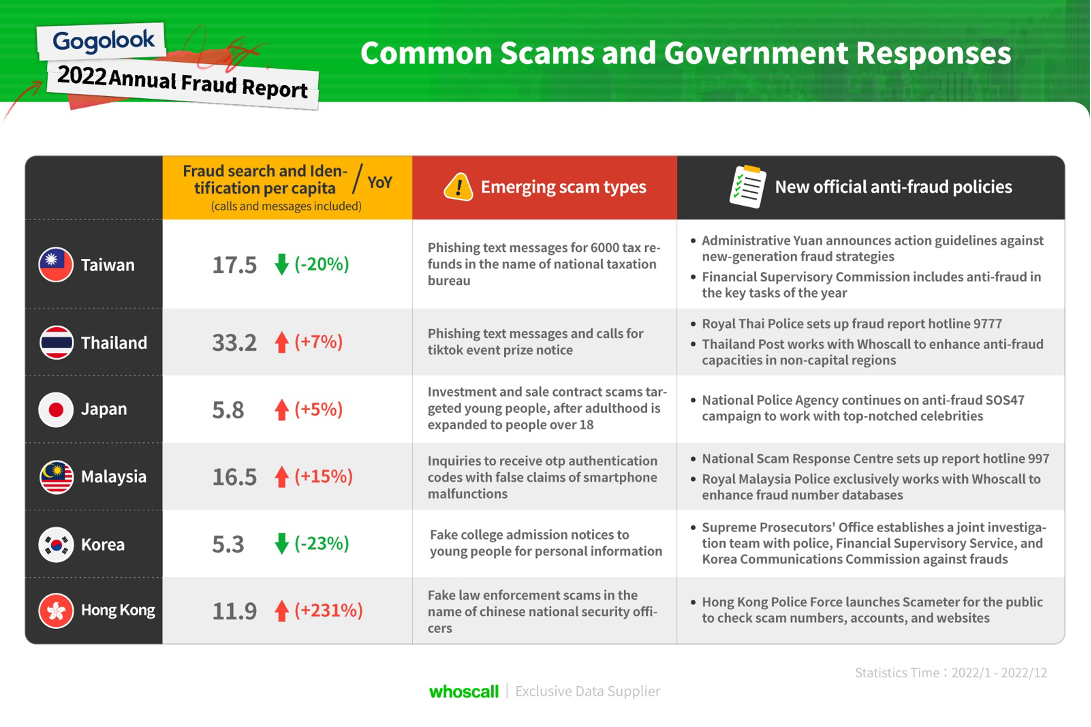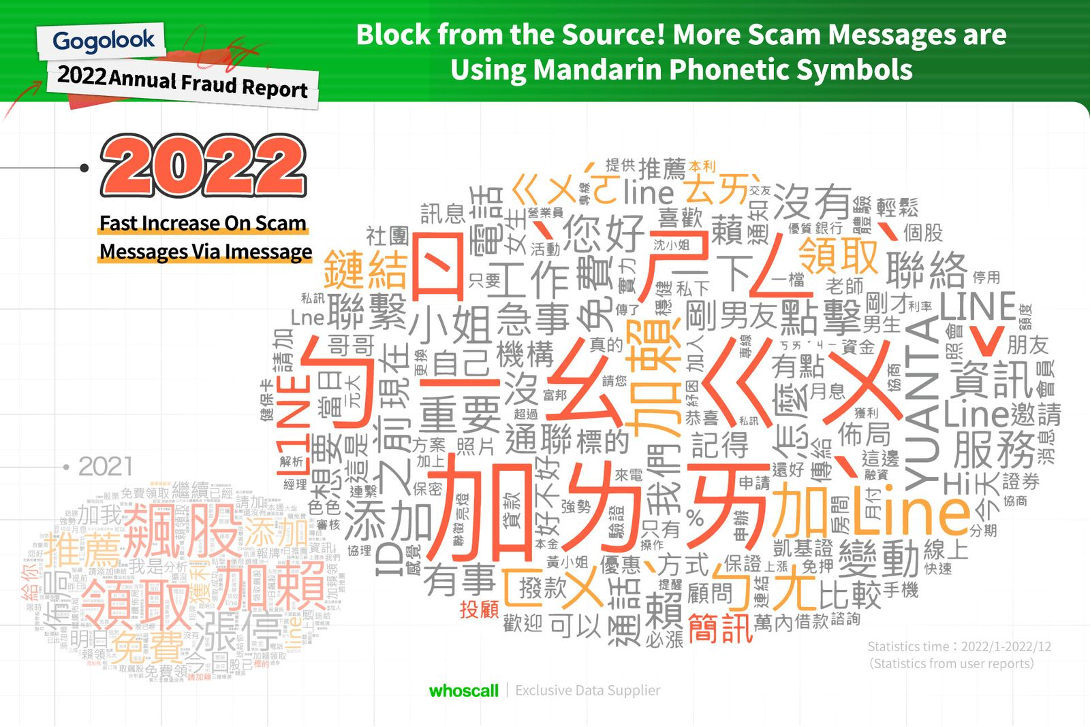
Over 400 million scam calls and messages are circulating worldwide, and text message scams continue to rise
Since online services further popularize under the COVID-19 pandemic, frauds have accelerated across countries in velocity for over two years, without any signs of slowing down. According to Whoscall, a caller ID software, it identified over 405.4 million scam calls and messages for global users in 2022. Even though the number slips by 13%, compared to the previous year, it remains a significant issue. Scammers prioritize text messages for high penetration rates and low costs, so messages account for 76% of “first contacts” in fraud cases, a new record. At the local level, text messages amount to 95% of fraud cases in Japan, and over 80% in Taiwan, Korea, and Malaysia. It shows high consistency among scammers worldwide.
Besides rampant scam messages, Whoscall blocks up to 460,000 short-form scam calls (such as 283617) in Taiwan a year, tripling from the previous year. Scam calls via VoIP systems (starting with +886) often pretend to be bookstores (such as books.com, eslite, and kingstone), and social welfare organizations (such as World Vision, Eden Social Welfare Foundation, and Huashan Social Welfare Foundation). Under the threat of personal information leakage, scammers acquire consumption records, and increase scams by multiple folds. People should be particularly mindful.

Is scamming rampant in Taiwan? Compare scam tricks and anti-fraud policies in different markets
Under these threats, anti-fraud industries will grow to US$129.2 billion in market scale by 2029, or a 22.8% CAGR, according to Fortune Business Insight. Frauds have also localized with unique formats and hotspots. Based on fraud search and identification (calls and messages included) per capita among Whoscall users, Thailand tops the list with 33.2 times on average annually. This figure underlines the severity in fraud threats. With the first surge of scamming messages in Hong Kong, fraud cases have increased in multiple folds. In comparison, numbers in Taiwan and Korea decrease slightly.
According to the research by Whoscall global team, scam messages closely follow local current affairs. For instance, after Taiwanese government decided to refund citizens for overtaxing, related scam messages emerged right away. Scammers in Thailand centered on the social network TikTok due to its rising popularity. In Hong Kong, scammers pretended to be public security officers from China. To fight against frauds effectively, governments have drafted anti-fraud policies, established designated authorities, and mobilized private companies and celebrities to raise anti-fraud public awareness. For example, Thailand and Malaysia have deployed new reporting systems, similar to the 165 hotline by Criminal Investigation Bureau in Taiwan. Korea has instructed prosecutors to set up anti-fraud teams across ministries. Japan launched an anti-fraud campaign with top-notched celebrities to successfully expand its reach and impacts. In these anti-fraud systems, Whoscall and other innovative applications also play a key role.

Have you received scam messages with Mandarin phonetic symbols? Whoscall witnesses how scammers attempt to evade detection
Since 2020, scam messages have stormed across Taiwan, and devastated many victims financially. In 2022, Whoscall identified approximately 47.64 million scam messages in Taiwan, a 9% decrease from the year before. Main tricks were still “fake investment advisors” and “fake bailout loans”. In response, Criminal Investigation Bureau coordinates with Whoscall, telcoms, and messaging service providers to stop these crimes from the source. It intimidates scammers from sending phishing or high-risk messages.
Scam message word clouds by Whoscall indicate that scammers are using more Mandarin phonetic symbols to evade detections. They also tend to replace certain alphabets with numbers, such as “Ca11” or “L1ne”. When users are more sensitive to suspicious or unnatural word combinations, they are more likely to identify frauds. After being targeted on traditional text message systems, scammers shift their focus to iMessage embed in iOS. As Apple has officially announced to include spam filter features on iMessage in iOS 16.2, users will be less likely to be scammed with iMessage.

Over 70,000 shared phone numbers in Taiwan may breed scams and jeopardize brand reputations
Phone calls and text messages are still main contact channels for various occasions. From service applications, bank notices, business development, job interviews, to restaurant reservations, these purposes all require phone communication. Text messages are widely used for OTP verification and customer relationship management. To reduce costs, some companies and government bodies choose VoIP or mass text message distribution services. As a result, the same number may be used for cram school class promotion calls, OTP verification, and pornography messages. Whoscall data show there are over 70,000 shared phone numbers in Taiwan, and each number may be used by two to over a dozen entities. Behaviors among these numbers, 56.7% are used to send text messages, and 43.3% are used for phone calls. Considering risks with shared numbers, Whoscall suggests corporations and government bodies apply or register verified numbers, to avoid frauds or tainted reputations.

- More about Whoscall features and services
- More about Whoscall Number service
- Download Whoscall Now

